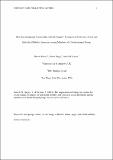Files in this item
How does intergroup contact affect social change? Its impact on collective action and individual mobility intentions among members of a disadvantaged group
Item metadata
| dc.contributor.author | Tausch, Nicole | |
| dc.contributor.author | Saguy, Tamar | |
| dc.contributor.author | Bryson, Jeff | |
| dc.date.accessioned | 2017-09-10T23:31:52Z | |
| dc.date.available | 2017-09-10T23:31:52Z | |
| dc.date.issued | 2015-09-10 | |
| dc.identifier | 150587928 | |
| dc.identifier | 2e1a8338-fcc1-4139-81cc-1ede084baff1 | |
| dc.identifier | 84941105442 | |
| dc.identifier | 000361143200006 | |
| dc.identifier.citation | Tausch , N , Saguy , T & Bryson , J 2015 , ' How does intergroup contact affect social change? Its impact on collective action and individual mobility intentions among members of a disadvantaged group ' , Journal of Social Issues , vol. 71 , no. 3 , pp. 536-553 . https://doi.org/10.1111/josi.12127 | en |
| dc.identifier.issn | 0022-4537 | |
| dc.identifier.other | ORCID: /0000-0002-9471-0673/work/46362110 | |
| dc.identifier.uri | https://hdl.handle.net/10023/11638 | |
| dc.description.abstract | A current debate surrounds the issue of whether prejudice-reducing interventions such as intergroup contact may reduce resistance to unequal intergroup relations among disadvantaged groups. Addressing this question, the present research investigates how positive contact with members of the advantaged group shapes action strategies to cope with disadvantage. Using survey data from a sample of Latino-Americans (N =112), structural equation modelling revealed that friendship contact with Anglo-Whites was overall negatively associated with interest in collective action. This relation was due to both reduced identification with the disadvantaged group and positive attitudes toward the advantaged group, which predicted reduced anger about inequality. Contact was also positively associated with an individual mobility orientation, a relation which was explained through increased perceived permeability. Individual mobility orientation did not, however, predict reduced motivation for collective action. The theoretical and practical implications of these findings for societal change and novel directions for future research are discussed. | |
| dc.format.extent | 182897 | |
| dc.language.iso | eng | |
| dc.relation.ispartof | Journal of Social Issues | en |
| dc.subject | Intergroup contact | en |
| dc.subject | Social change | en |
| dc.subject | Collective action | en |
| dc.subject | Anger | en |
| dc.subject | Individual mobility | en |
| dc.subject | Latino-Americans | en |
| dc.subject | BF Psychology | en |
| dc.subject | NDAS | en |
| dc.subject | BDC | en |
| dc.subject.lcc | BF | en |
| dc.title | How does intergroup contact affect social change? Its impact on collective action and individual mobility intentions among members of a disadvantaged group | en |
| dc.type | Journal article | en |
| dc.contributor.institution | University of St Andrews.School of Psychology and Neuroscience | en |
| dc.identifier.doi | 10.1111/josi.12127 | |
| dc.description.status | Peer reviewed | en |
| dc.date.embargoedUntil | 2017-09-10 |
This item appears in the following Collection(s)
Items in the St Andrews Research Repository are protected by copyright, with all rights reserved, unless otherwise indicated.

